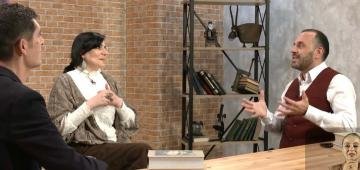 |
Soviet censorship and medieval literatureDuring the Soviet period, especially in the 1930s and 1940s, Armenian medieval literature was subjected to strict censorship. Not only were the works of our medieval authors not published or were published in abbreviated form, but literary criticism also presented and interpreted them with distortions corresponding to the ruling ideology. In the program “Parallel Readings,” literary critics Hayk Hambardzumyan and Arkmenik Nikoghosyan discuss the peculiarities of the presentation of medieval literature during the Soviet years. |
 |
Yeghishe Charents' poems in a new wayThe second volume of the academic edition of Yeghishe Charents' works has been published, which includes the poet's poems written between 1915 and 1931. How does this edition of poems differ from previous editions and what distinguishes Charents' poems written during this period? Literary critics Hayk Hambardzumyan and Arkmenik Nikoghosyan discuss these issues in the program "Parallel Readings". |
 |
Literary 2025The year was full of literary events, anniversaries, and new and important publications. The “Parallel Readings” program series covered almost all the important events of the literary year, presented the literary events, and presented various literary issues with thematic programs. In the last program of this year’s “Parallel Readings” program series, literary critics Hayk Hambardzumyan and Arkmenik Nikoghosyan summarize the literary 2025. |
 |
Ruben Hakhverdyan: song and poetryWhat artistic and poetic features do the lyrics of Ruben Hakhverdyan's songs have, what thematic directions do they have, can we consider those lyrics poems and why? Literary critics Hayk Hambardzumyan and Arkmenik Nikoghosyan discuss the topic on the "Parallel Readings" program. |
 |
What to read: must-read lists“What to read?”: When answering this question, people more often rely on lists compiled by famous universities, libraries, publishing houses, websites, and famous people. Are these lists truly impartial, or do they reflect the tastes, interests, and influence of certain groups? To what extent can we trust these lists, and how do they shape reading perceptions and the quality of literature? Literary critics Hayk Hambardzumyan and Arkmenik Nikoghosyan discuss the program “Parallel Readings.” |
 |
Garegin Srvandzdyants-185The 185th anniversary of the birth of the founder of Armenian philology and ethnography, the great Armenian folklorist and philologist Garegin Srvandztyants has been celebrated. The materials and studies written by Srvandztyants have been of great importance in the recognition and popularization of our folk culture, and the awakening of the national spirit. The activities, notes, and studies of the great philologist are discussed in the program "Parallel Readings" by literary critics Hayk Hambardzumyan and Arkmenik Nikoghosyan. |
 |
About one story: Hrant Matevosyan, "The Dogs"Hrant Matevosyan's story "Dogs" is among his "youthful" works and is somewhat different from the other famous works of the Armenian prose master. The writer uses remarkable stylistic devices here, makes subtle references to other works of Armenian and world literature. Hrant Matevosyan's story "Dogs" is discussed on the "Parallel Readings" program by literary critics Hayk Hambardzumyan and Arkmenik Nikoghosyan. |
 |
Avetik Isahakyan's loves and romanceWhen talking about Avetik Isahakyan's love poetry, the image of the poet's youthful love, Shushanik, is traditionally emphasized, but there were other sources of inspiration in Isahakyan's life as well. Isahakyan's large-scale letters, especially published in recent years, provide an opportunity to see more clearly the path from emotion to poetry and the real addressees of those poems. In the framework of the "Parallel Readings" program, literary critics Hayk Hambardzumyan and Arkmenik Nikoghosyan discuss these issues. |
 |
Voice and speech in spiritual songs, part 2Spiritual songs are of a general nature, as they are based on the original texts of the Holy Scriptures and are associated with certain holidays and rituals. In this case, where is their originality, authorial or national uniqueness? How does Armenian express the unity of sound, speech and ritual, what do spiritual songs inspire in the believer or listener, and what means do they use? These questions are discussed in the “Parallel Readings” program by literary critics Hayk Hambardzumyan, Arkmenik Nikoghosyan, and musicologist Arusyak Tamrazyan. |
 |
Voice and speech in spiritual songs, part 1Armenian medieval spiritual music - hymns, spiritual songs, created as components of ritual, are unique prayers, where words and melody, ritual and artistic, authorial and universal are combined. How did our hymn writers achieve such a striking harmony? Literary critics Hayk Hambardzumyan, Arkmenik Nikoghosyan, and musicologist Arusyak Tamrazyan discuss these issues in the program "Parallel Readings". |
 |
The Translation of the "Book of Books" and Armenian Medieval LiteratureAlthough the Armenian people had a rich folklore even before the invention of writing, Armenian literature essentially began with the invention of writing and the translation of the Bible. How did the translation of the Bible affect the development of Armenian medieval literature, and how was the Armenian written artistic tradition formed? Literary scholars Hayk Hambardzumyan and Arkmenik Nikoghosyan discuss these issues in the program "Parallel Readings." |
 |
The charm of the Hamastegh's proseHamastegh's literature is one of those exceptional works that was warmly received both in the Diaspora and in Soviet Armenia. And the reason for this was absolutely not that Hamastegh's prose did not have any ideological accents that were unacceptable or not native to either side. The secret lies in the depth of his literature, high artistry, and most importantly, a unique, sometimes inexplicable charm. Literary critics Hayk Hambardzumyan and Arkmenik Nikoghosyan talk about the writer's prose in the "Parallel Readings" program. |